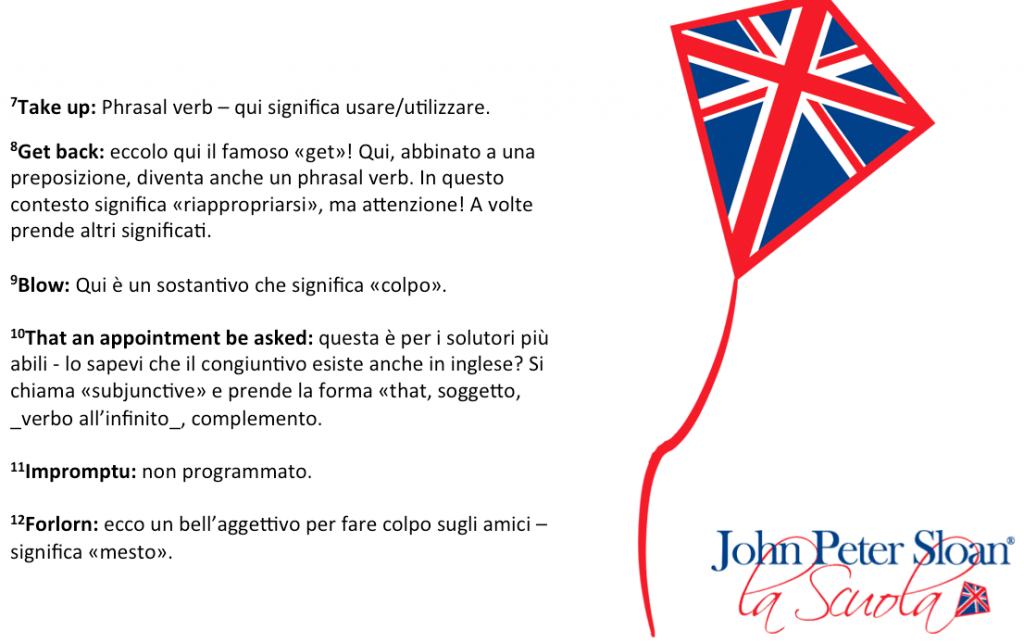Translation by Allen Montrasio, John Peter Sloan la Scuola
Ten-thousand and eighty every seven days, no more, no less. These are the minutes we can dispose of in a week to deal with the four main instances of life: work, family, others, ourselves as individuals.
The average person sleeps seven hours each day, and that’s almost three-thousand minutes gone. Another one-hundred and fifty are used commuting[1], assuming we’re lucky enough to live close to our office. A dream.
More than one-thousand minutes are used for eating and other physiological needs; however these can also double as part of the time we dedicate to our families and ourselves. We are left with less than six-thousand minutes, three-thousand three-hundred of which are dedicated to work. The first conclusion we can reach is that the quest[2] for an adequate work-life balance is an uphill struggle.
The need for efficiency in work time
Time is a scarce commodity[3], It cannot be reused or stored for a rainy day[4] and pressure at work is high: deadlines, commitments, answers due, problems to solve are all there crowding our mind. This is why the effort to make a more efficient use of time is not just an option we have, but our duty.
In my professional life, a study on the use of managerial time I participated in while I was living in Brazil a couple of years ago was a revelation. It was conducted by the Harvard Business School, Columbia University and the London School of Economics on a panel[5] of 800 executives of European US and Latin American companies, and the methodology consisted in writing down every fifteen minutes the tasks carried out in the work day. After some months, the participants received a report with the general findings and their individual ranking.
Results of the study on the use of managerial time
The study revealed that managers work on average 10.7 hours a day, Monday to Friday, plus four hours on average during weekends, dedicating less than a quarter of this time to individual work and as much as 76 percent to working with other people (one-on-one or collective meetings), mostly collaborators or people from within the company.
So far so normal[6], but the finding that caught my attention most, already at the time of collecting data was the one about planning activity. The study showed that 34 percent of time in meetings is spent dealing with unplanned activities, a huge and – by definition – unproductive amount of hours.
The importance of self awareness and improvement through 4 rules
As few as 10 percent of the managers polled were able to organise 92 percent of their diary. And myself? More than 60 percent of my time was taken up[7] by unplanned activities: I was more of a fireman than a manager.
It had been necessary insofar as I had a staff of very junior people who had not yet acquired confidence in dealing with problems. However, it was also true that I’d left my door open too much and my staff had ended up involving me in all of their issues, without asking if it was really necessary and without properly analysing the situation.
A different approach was needed, that would allow me to get back[8] my productivity without losing control of the general situation.
Rule 1: plan the ordinary and the extraordinary
So I decided to plan regular one-on-one meetings with all my function managers, with a frequency proportional to the complexity of each situation, and to create a list of open points on which I expected feedback at the following meeting.
Another blow[9] to the unpredictable was delivered when I also started to plan extraordinary meetings in advance. This may seem a contradiction in terms, but it works: unless you are really firefighters, emergency doctors or cops, almost no problem is actually so dramatically urgent as to not be discussed without interrupting your current activity and distracting your attention from the task at hand.
Rule 2: call appointments so as not to improvise (unproductive) content
What’s more, requiring that an appointment be asked[10], forces the collaborator to organize their thoughts and to collect support material, making the meeting more productive and – of course – shorter.
Rule 3: “have you got a minute to spare?” does not exist
The door can stay open, but only by appointment. Call a stop on impromptu[11] appearances at the door accompanies by forlorn[12] expressions and the dreaded request: “boss, do you have a minute to spare?”. Because leading by example is more effective, my staff had the same privilege. When I needed to speak with them, I would turn up at their desk, but only to set up the time when we would meet to discuss the issue.
For all meetings, one-on-one or collective, punctuality was always a rule. Latecomers would pay a fee that went in a pot for extra-work activities. I also mandated that phones be turned off and that closing times be respected.
Rule 4: reduce the time spent reading e-mail
Finally, to reduce the time spent reading useless e-mails, I informed my staff that I would have read my inbox three times a day, at fixed times dedicating a limited amount of time to each session. Those who had urgent requests would have to find other ways to inform me, otherwise they would have to wait and hope that I would reach their e-mail in the limited time I dedicated to my inbox.
These are four simple but effective rules. Trying is believing, and if you have rules of your own, just add them to the list: the need to reduce waste is infinite.







